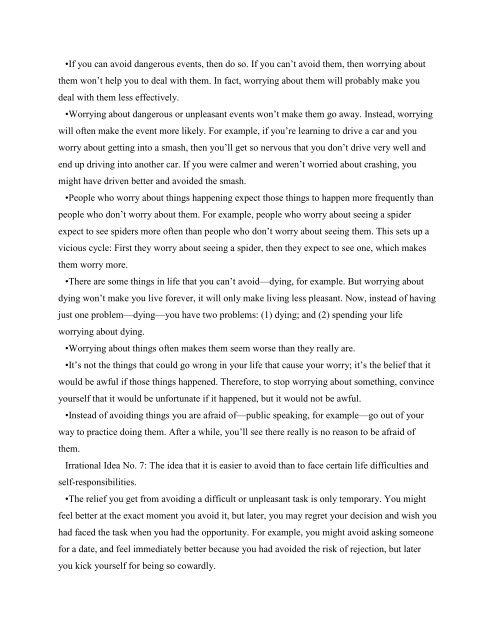The Duchy of Jerald
You also want an ePaper? Increase the reach of your titles
YUMPU automatically turns print PDFs into web optimized ePapers that Google loves.
•If you can avoid dangerous events, then do so. If you can’t avoid them, then worrying about<br />
them won’t help you to deal with them. In fact, worrying about them will probably make you<br />
deal with them less effectively.<br />
•Worrying about dangerous or unpleasant events won’t make them go away. Instead, worrying<br />
will <strong>of</strong>ten make the event more likely. For example, if you’re learning to drive a car and you<br />
worry about getting into a smash, then you’ll get so nervous that you don’t drive very well and<br />
end up driving into another car. If you were calmer and weren’t worried about crashing, you<br />
might have driven better and avoided the smash.<br />
•People who worry about things happening expect those things to happen more frequently than<br />
people who don’t worry about them. For example, people who worry about seeing a spider<br />
expect to see spiders more <strong>of</strong>ten than people who don’t worry about seeing them. This sets up a<br />
vicious cycle: First they worry about seeing a spider, then they expect to see one, which makes<br />
them worry more.<br />
•<strong>The</strong>re are some things in life that you can’t avoid—dying, for example. But worrying about<br />
dying won’t make you live forever, it will only make living less pleasant. Now, instead <strong>of</strong> having<br />
just one problem—dying—you have two problems: (1) dying; and (2) spending your life<br />
worrying about dying.<br />
•Worrying about things <strong>of</strong>ten makes them seem worse than they really are.<br />
•It’s not the things that could go wrong in your life that cause your worry; it’s the belief that it<br />
would be awful if those things happened. <strong>The</strong>refore, to stop worrying about something, convince<br />
yourself that it would be unfortunate if it happened, but it would not be awful.<br />
•Instead <strong>of</strong> avoiding things you are afraid <strong>of</strong>—public speaking, for example—go out <strong>of</strong> your<br />
way to practice doing them. After a while, you’ll see there really is no reason to be afraid <strong>of</strong><br />
them.<br />
Irrational Idea No. 7: <strong>The</strong> idea that it is easier to avoid than to face certain life difficulties and<br />
self-responsibilities.<br />
•<strong>The</strong> relief you get from avoiding a difficult or unpleasant task is only temporary. You might<br />
feel better at the exact moment you avoid it, but later, you may regret your decision and wish you<br />
had faced the task when you had the opportunity. For example, you might avoid asking someone<br />
for a date, and feel immediately better because you had avoided the risk <strong>of</strong> rejection, but later<br />
you kick yourself for being so cowardly.





